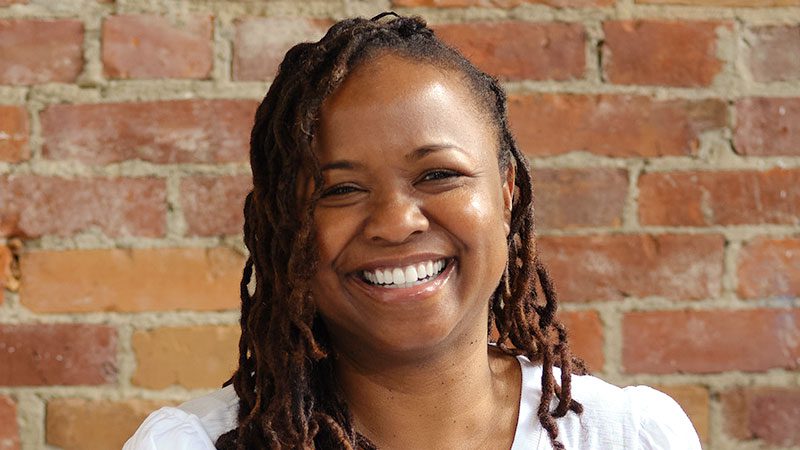Get great tofu from star chef Makini Howell
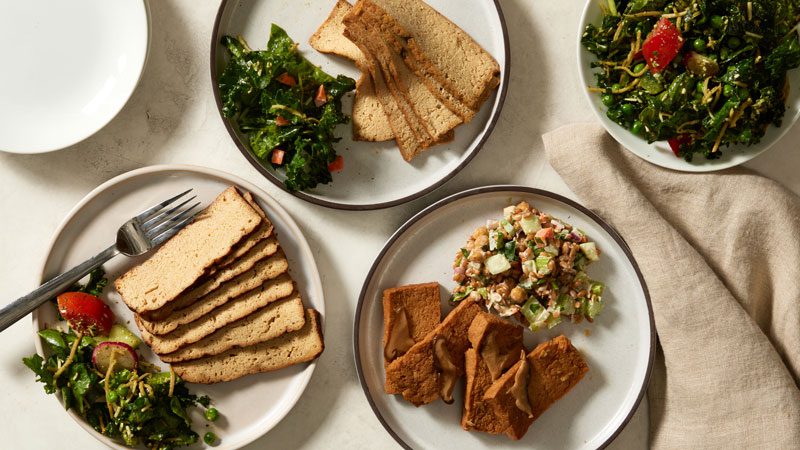
For years, diners came to Makini Howell’s restaurants for her nationally acclaimed vegan meals. Now, with a built-from-scratch Seattle tofu factory, she’s bringing vegan food to us.
Howell’s certified-organic “Makini’s Tofu,” debuting in PCC deli dishes in June, comes both plain and in flavors like ginger-shitake. Her products include a savory smoked tofu and “tofustrami,” a chorizo-style grind that could go in tacos or nachos, a crispy air-fried version that could easily substitute for mozzarella sticks, and more.
It’s an “organic, clean, delicious protein,” Howell said recently on a factory tour, a foundational ingredient solving what she calls a “perplexity” for people who want to eat better but don’t have everyday ideas for using tofu.
With her products in hand, “I can make burritos, I can make a ragu…I can make fresh rolls, I can make stir fries, I can make yakisoba, I can go in all of these different directions that you could go with another type of protein. And I’m showing you, here’s how you do it with tofu.”
Her business arrives as interest in plant-based foods is on the rise but popularity is fading for faux-meat products based on isolated proteins and other highly-processed ingredients. The Puget Sound region (long home to Island Spring organic tofu, founded by an early PCC board member), seemed an obvious place to expand the possibilities available — both for vegans and vegetarians, and for omnivores who just want better protein options.
Her tofu is “three steps from nature,” she said. It transmutes from organic soybeans to soy milk to tofu within the factory’s four walls, flavored by spice blends and marinades made in the building, and finished in the smokers and ovens there. It’s then frozen and shipped, currently through local distributor Charlie’s Produce.
Restaurants like Plum Bistro changed how people thought about vegan food in Seattle. Ultimately, she hopes, Makini’s Tofu can change what our region thinks is possible for better foods — and better workplaces.

Meet Seattle chef Makini Howell
Howell grew up in a vegan family at a time when it was almost unheard of in mainstream America. Her parents and siblings were part of an early wave of vegan businesses in the Northwest, including the Hillside Quickies sandwiches sold in co-ops and later their own shops.
After years as a graphic designer and clothing designer in New York City, Howell founded Plum Bistro in Seattle in 2009 to serve the sort of “gratifying vegan food” she couldn’t find elsewhere. Other ventures followed — as did a Plum cookbook and a “Simple Goodness” book on home cooking, plus stints as personal chef to the stars, including singer Stevie Wonder on his 2015 “Songs in the Key of Life’ tour.
Howell closed her restaurants earlier this year to focus on the factory, which she began planning after her father’s death in 2021. Her early lessons in cooking came from him, and products like her “Baba’s Smoked Tofu” are named for him.
“I did not want to stop saying my father’s name. He was such a wonderful person, and I didn’t want the world to forget him, and he had so much to offer,” she said.
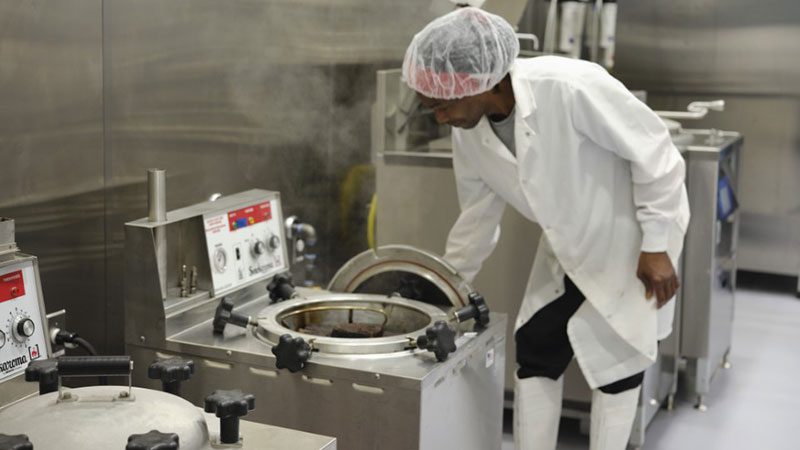
Building a tofu factory
The factory in the center of Georgetown was completely rebuilt for its current purpose.
What Howell calls “the heart” of the business isn’t the silo of organic soybeans, or even the gleaming machinery imported from Taiwan. It’s a daycare room, with licensing in process, to provide free daycare for employees.
She’s seen the stress and career challenges her employees have faced trying to find — and afford — child care over the years and wanted to build the center into her next endeavor. Besides, she said, kids bring joy to a building.
Another side feature is the kitchen, where she makes what she jokes are “Makini’s Corporate Lunches” — meals for her crew on production days, testing recipes and building culture. Her staff includes former Plum employees and others she and her family have worked with over the years — Cortwright Quinland, the staffer scooping spices into blends as she spoke had learned recipes from her own father.
“I can’t personally make all of the tofu, but I can take care of the people that do,” Howell said. “If I feed them well, if I provide a safe space for their children, if I care, then they too will care, and will create this sort of trade of good energy.”
Howell has always made tofu for her restaurants, but producing it at this scale is a whole other realm.
“She’s maybe the scrappiest person I’ve ever seen,” said Ann Altman, her marketing manager, who first met Howell in the chef’s role as Auntie — Howell’s been deeply involved in the life of her nephew, Yaqeen Aguda, and serves on the board of his elementary school. The factory setup, Altman said, is something Howell “basically willed into existence.”
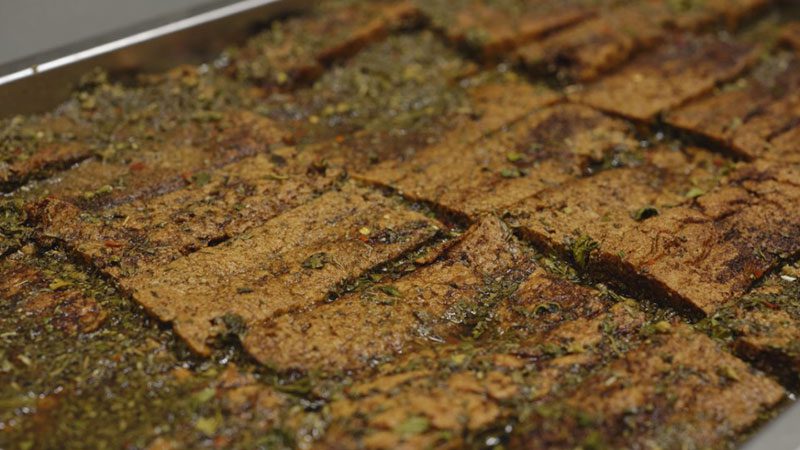
Howell started by researching tofu factories on Google Earth. She raised money for the ambitious project without losing ownership or creative control of the business — a particular stumbling block for many independent restaurateurs, especially women and people of color. She flew to Taiwan to meet with a manufacturer who could build one to her specifications, and had the machinery shipped to Seattle. Teams from Taiwan helped her set it up and train her crew.
It’s a major endeavor: The factory has capacity for 30,000 pounds of tofu per shift, each batch is about 2500 pounds, starting with about 880 pounds of soybeans.
The soybeans make an audible noise as they skitter through piping from the silo outdoors, she said, then drop into soaking bins on the factory floor. In the semi-automated setup, once the water is drained, the soaked beans are ground into a slurry, pasteurized, then piped to a soy milk holding tank. There, the okara — the husk from the beans — is separated out for compost that’s ultimately recycled into biofuels.
The milk is filtered through a fine mesh, then fills a carousel of metal containers, where it’s auto-injected with coagulants, given time to firm up, then moved down a conveyer belt where it’s transferred to cheesecloth-lined molds and gets its initial pressing. A robot arm then transfers it to “the stacking portion of the line” where different timelines and pressures results in different textures, from silken to extra-firm. When done, it’s sliced into bricks and might be pressure-smoked, baked, or fried with various spice blends, depending on its ultimate destination.
Makini’s Tofu is starting out in PCC’s deli (see below) and Howell hopes ultimately to sell frozen tofu in grocery freezer cases. (Freezing tofu, to Howell’s taste, allows it to absorb flavor better and makes for a more versatile texture, as well as more flexible storage.)
“There’s a lot of synergy between us,” Howell said. “When I talk to PCC about tofu, we speak the same language.”
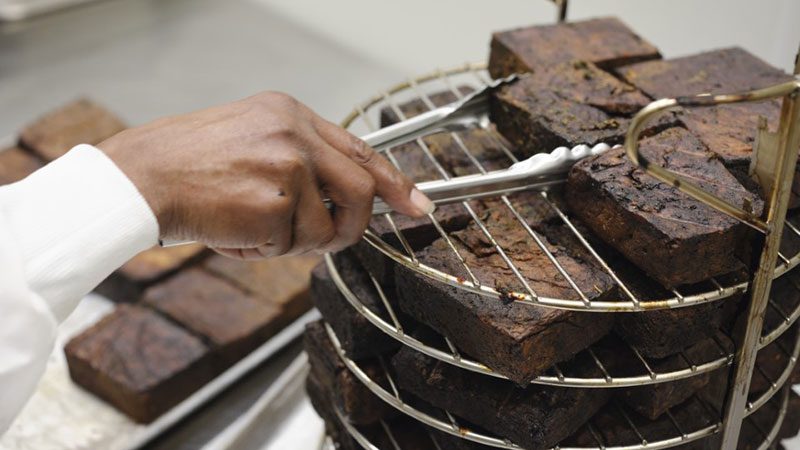
Makini’s Tofu at PCC
Find Makini’s Tofu in the PCC Market Kitchen!
Initial varieties available in the deli service case and grab & go areas are Baba’s Smoked Tofu, Tofustrami and Shitake Ginger Tofu. Howell’s tofu will be featured in a variety of PCC deli recipes as well.
Watch for a new PCC private label deli salad, Makini’s Smoked Tofu with Tomato Basil Dressing.
